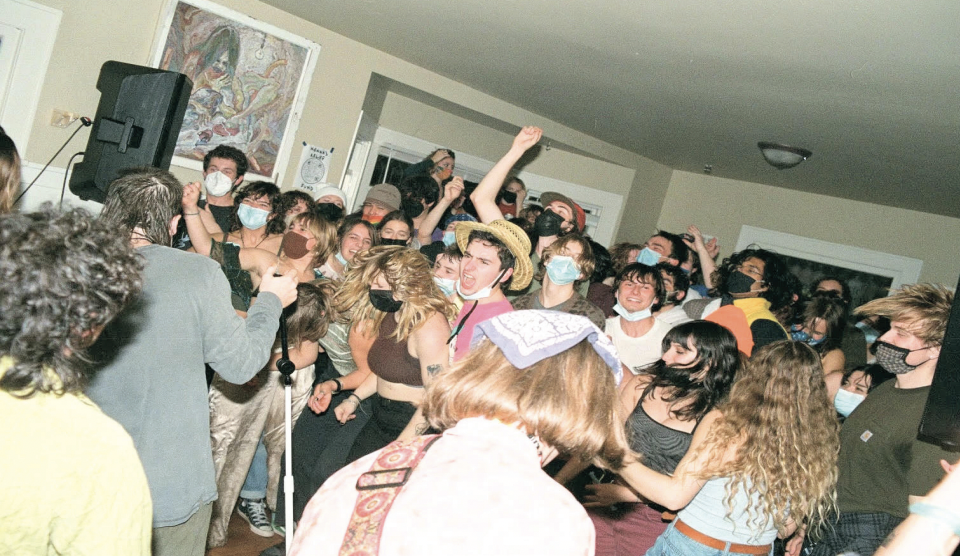
By Ari Lauer-Frey
The last couple of years — the pandemic period especially — has altered what it means to be a member of the campus community and how students can interact with one another. This time has particularly impacted the live music scene on campus. The difficulty of safely bringing together such a significant number of people has, in many ways, stunted the ability to see and perform live music until relatively recently. However, things are looking up for the University’s music scene. More bands are forming, and opportunities to see live music continue growing. The forced hibernation of the pandemic also offered those involved in the music community a chance to reflect on what the scene has been in the past. With this introspection comes a new push to make the music scene a more positive experience.
Beyond the limitation on public gathering, the pandemic’s almost two-year pause caused disruption in the music scene on campus. Students involved in bands and musical spaces graduated and moved on. University organizers were forced to rethink their ways of creating community engagement. Houses for parties and house shows that were often passed down instead became inherited by non-students. The scene lost its means of continuity. Eliana Goldberg, senior and general manager of the school radio station KUPS, also sees the significance of continuity in the past of KUPS. “There used to be houses around that were known as KUPS houses, and they were KUPS houses for years and years and years. And touring bands could come through, and they would stay at those houses, and they would play at those houses,” said Goldberg. Those houses no longer exist, at least not in any way related to KUPS.
But this process of change has not been solely damaging. Routines can easily become ruts and bad habits. If any redeeming feature can be found in the changes and halts brought by the pandemic, it is the opportunity for reflection and reassessment it has offered. KUPS is making efforts to change what its presence means on campus, specifically in attempts to provide increased inclusivity and safety. Further reflecting on KUPS, Goldberg acknowledges how KUPS fell short in the past. “It was not fully as safe as I think a lot of KUPS events are now, and I think we have a huge push for safety now. At every KUPS event you go to, there’s always people who are sober. The staff is all trained in looking for signs and stuff like that. We have people who are making sure people are walked home. There’s sexual assault training happening, there’s DEI training, and none of that happened before.” However, Goldberg also wanted to make it clear that “all that said, I think there is still a lot of work KUPS needs to do.”
KUPS has also been trying to reenergize Puget Sound’s arts and social life through the various events they have hosted since returning to campus. KUPS fest has become a popular event in which many student-led bands perform, KUPS open mic nights have been popping up around campus more and more frequently, and KUPS will be hosting an art market in the Rotunda on February 27.
Part of the change can be credited to the reexamination of the campus music community that time and distance have allowed. But also necessary to consider for the change is the difference in the student body and the culture. Milo Hensley is one of the members of cush hill, one of a handful of student-owned houses known for hosting house shows and other social gatherings. They perceive the unique situation of the pandemic as an opportunity for a new approach to the music scene. “Now you have two full years’ worth of students, new students who were in high school during COVID and don’t know what this place was like before COVID at all. And I think that’s lent itself to a whole other thing,” they said. A renewed excitement and optimism accompany this new beginning to the music scene, the time away having given many students the urge to create and perform. “The newer crowd are less afraid to start bands. There’s so many bands composed of younger students now, which is sick. There used to be I feel like only a handful of house show bands of UPS students, maybe two or three, whereas now there’s a lot,” said Hensley.
There are still many ways in which social life has yet to return to a state of normalcy. But perhaps the goal should instead be a communal effort to achieve a new normal. The Puget Sound music scene’s reestablishment represents such an effort. Students are taking charge of bringing back an essential facet of college culture and life. And the necessity to start from step one provides an opportunity to make meaningful change, aware of what has been, but not limited by it. Drew Katigbak, the bass guitarist of student band Polly’s Pocket, has high hopes for what the future looks like. “More upbeat, community-driven, I think more representation, and I guess more house shows, in general, would be nice too,” she said.
This semester seems hopeful, with more houses hosting live music, more bands forming, and more opportunities for engagement with the arts and fellow students in general. This revitalization has largely been an effort of students eager to be creative and make connections with each other after a long period of isolation. As such, where the community ends up is very much so in the hands of students. “I just feel like if we want a social life, we’re gonna have to make it,” says Katigbak.
